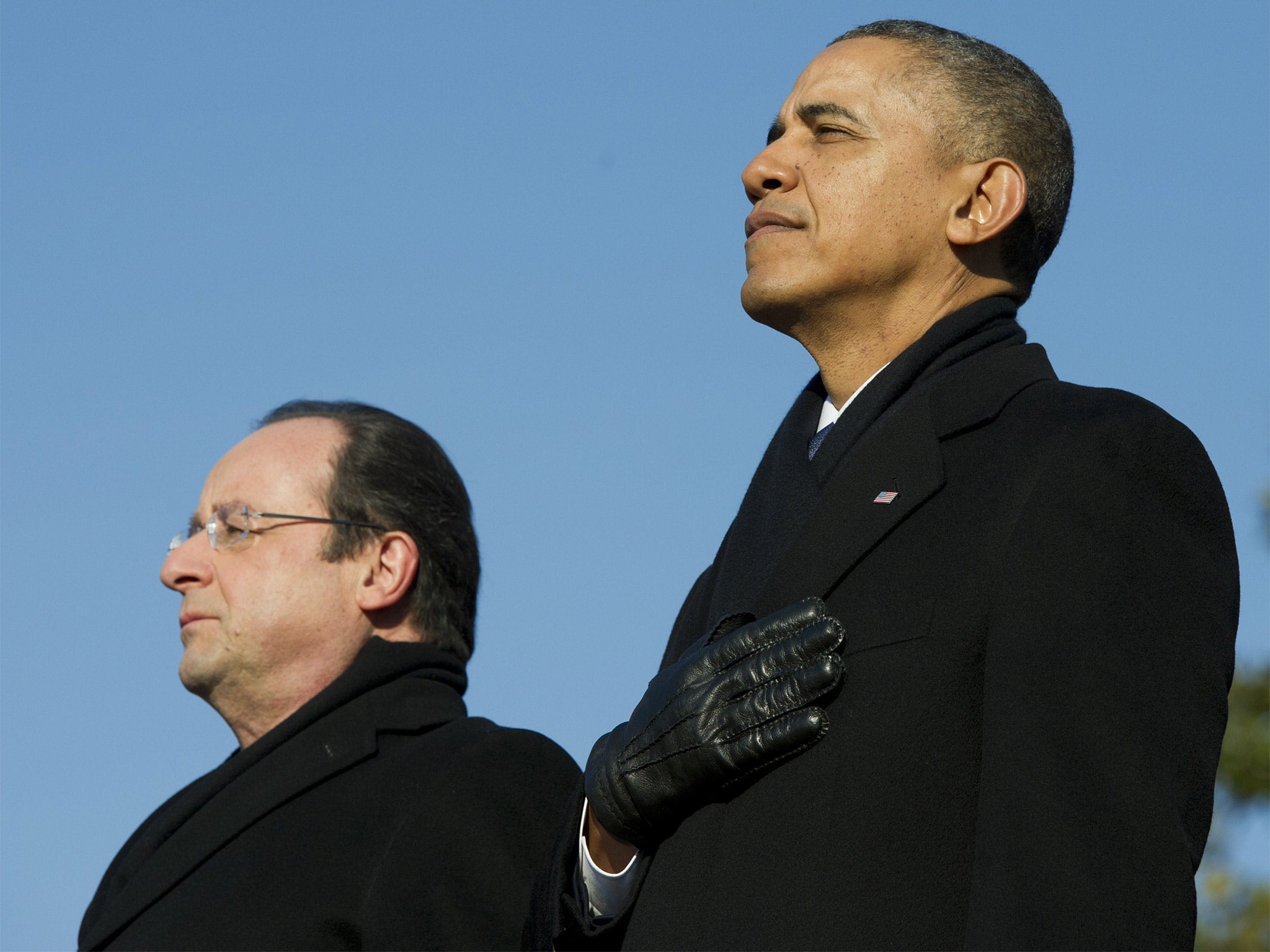Hollande demands assurance from Obama that US is not spying on him anymore in wake of new WikiLeaks 'revelations'
'It is like finding out that a partner has been unfaithful to you but you remain in love,' claimed one senior French official

The French President François Hollande has phoned Barack Obama to demand guarantees that US spy agencies were no longer bugging his private conversations.
The call – partly theatrical, partly sincerely angry – followed the revelation that the US had tapped the phone calls of Mr Hollande and his two predecessors in the period 2006-2012. The heads of the French external and internal intelligence services will fly to Washington in the next few days to discuss the latest WikiLeaks revelations on how the National Security Agency snoops – or once snooped – on one of America’s closest allies.
In the face of calculated outrage among French politicians on both the right and left, Mr Hollande asked Mr Obama to renew guarantees already given in 2013 and 2014 that Washington no longer bugged its friends. A similar demand was handed to the US ambassador, Jane Hartley, when she was summoned to the French foreign ministry. Mr Obama was said to have reiterated his commitment to end past practices that were considered “unacceptable” by its allies.
In Washington, the National Security Council said: “We are not targeting and will not target the communications of President Hollande”. The statement pointedly failed to address what might have happened in the past. Off the record, French officials admitted that there was nothing especially surprising in the revelations published by WikiLeaks, as well as by Libération and by the news website, Mediapart.
One senior official told Le Monde: “It is like finding out that a partner has been unfaithful to you but you remain in love. Of course, we will make a scene.”
Even the French ambassador in Washington tweeted a Gallic shrug. Gérard Araud said: “All diplomats live with the certainty that their communications are being listened into and not just by one country. That is the real world.”
WikiLeaks had already revealed in 2013 that Germany, France and other allies were under American surveillance. All the same, French politicians of the left and right competed to find words lurid enough to excoriate Washington’s behaviour. A statement by President Hollande’s Socialist Party accused the US of “truly stupefying state paranoia”. Other minor French politicians called on France to retaliate by expelling the US ambassador.
In question time in the National Assembly, the Prime Minister Manuel Valls said the revelations were “no surprise” but that did not prevent them from being a shock. It was the timing of the revelations which most angered President Hollande. His own government is on the point of passing legislation giving France sweeping new electronic surveillance powers to assist in the fight against terrorism. French officials suspect a deliberate attempt to embarrass the President by the French left-wing publications which shared in the WikiLeaks “scoop”.
There was little startlingly new in the information gathered. One leaked memo, headlined “Global Sigint Highlight”, revealed that Mr Sarkozy, when President in 2008, thought that he was the only world leader capable of responding effectively to the banking crisis and the threatened global recession.
More interestingly, a “sigint” summary from the earliest days of the Hollande presidency in 2012 reported that he was worried, even at that stage, that Greece might be forced out of the euro.
The leaked US intelligence report says that Mr Hollande was concerned that Chancellor Angela Merkel was “unwilling to budge” and had “given up” on Greece. Such a hard line, the French President thought, might force the Greek people to “react by voting for an extremist party”.
This suggests that Mr Hollande is a good political analyst; it does not add dramatically to the store of the world’s knowledge. There may, however, be more revelations to come. Edwy Plenel, the director of Mediapart, said that he expected soon to publish “explosive” new information on how the US spied on the “inner workings” of the French presidential election campaign in 2012.
Subscribe to Independent Premium to bookmark this article
Want to bookmark your favourite articles and stories to read or reference later? Start your Independent Premium subscription today.

Join our commenting forum
Join thought-provoking conversations, follow other Independent readers and see their replies